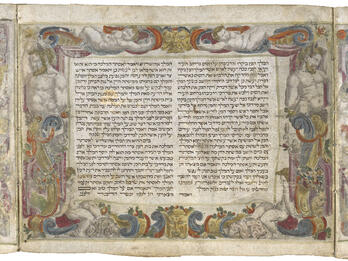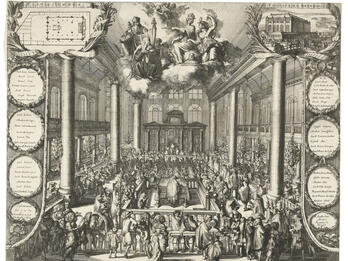Ordinance: On Lending Money
In view of the fact that many interfere with their neighbors’ vested rights to have sole privilege of lending money at interest in certain localities, and very often the agency of the non-Jewish nobility is employed to compel the owner of the privileges to surrender them, and those who have the law on their side find themselves driven from their positions and the wicked displacing them and no one looks to God or to his Torah, which forbids such practices, in spite of the fact that many of our predecessors have protested against the unfairness of the practice, and whereas the cry of the oppressed of various places, especially among the owners of these exclusive rights of money lending, has reached us, and whereas it is to be feared that the protest of the local Rabbis against the unfairness and the injustice will be without avail, and they may even be cast into prison, therefore have we decided:
That no Jew or Jewess shall interfere with the exclusive rights of moneylending that is at present possessed by any other Jew;
That if anyone has already made an attempt to secure for himself the rights that in fact belong to a fellow-Jew, he shall be forbidden to make use of the transfer of the rights nor shall any heir of his or anyone whose rights are derived from such an unjust person make use of them, until the matter is decided by a Jewish court;
That if anyone shall violate these ordinances he shall be excommunicated, and no one shall trade with him, either taking part in the rights enjoyed by him or hiring it in whole or in part nor make any contract with him regarding the Hazakah [privilege—Ed.], or have any dealings with him at all, even so far as to sit in his company;
This ordinance of ours shall not be set aside until the guilty one sees that the rightful owner of the exclusive rights is re-instated in them, and is compensated for his loss. Moreover the transgressor shall present himself before two ordained Rabbis to receive such penance as they may direct him to undertake.
Ordained here at Cremona, on Wednesday, the fourth of Kislev, the fifteenth of November, of the year 5342 (1582), on condition that the ordinance is not opposed to the government.
Isaac, called Zelikmann b. Gershom
Aaron David b. Aaron Norlingen
Ephraim b. Menahem Norlingen
Abraham Menahem Port Ha-Kohen
Moses Menahem Kohen.
The ordinance of the above-mentioned leaders has been announced by men in the three synagogues of Cremona.
The decree of the Sages of Cremona is proper and we second their decisions.
Venice, twentieth of Tebet, 5342
Judah Katzenellenbogen
Jacob b. Abraham Solomon Ha-Kohen
Abigdor Cividal
The ordinance was announced in all the synagogues of Venice by the undersigned, according to the command of his highness Gambur, and a copy of it was placed on the gate of the Ghetto in the usual place, Abraham b. Uri, the Shamash of the Community of Venice, who has written and signed this on Wednesday the twenty-fifth of Tebet, 5342.
I, too, agree with all that has been written above.
Isaac b. Judah, minister to the Community of Rome.
The above ordinance was announced in all the synagogues at Rome on Sabbath during the prayers, by the agent of the community with the permission of the Court, as usual.
Isaac of Lifatil.
I also testify that it was announced at the Community of Rome.
Ben Zion of Norzi.
Credits
Published in: The Posen Library of Jewish Culture and Civilization, vol. 5.







